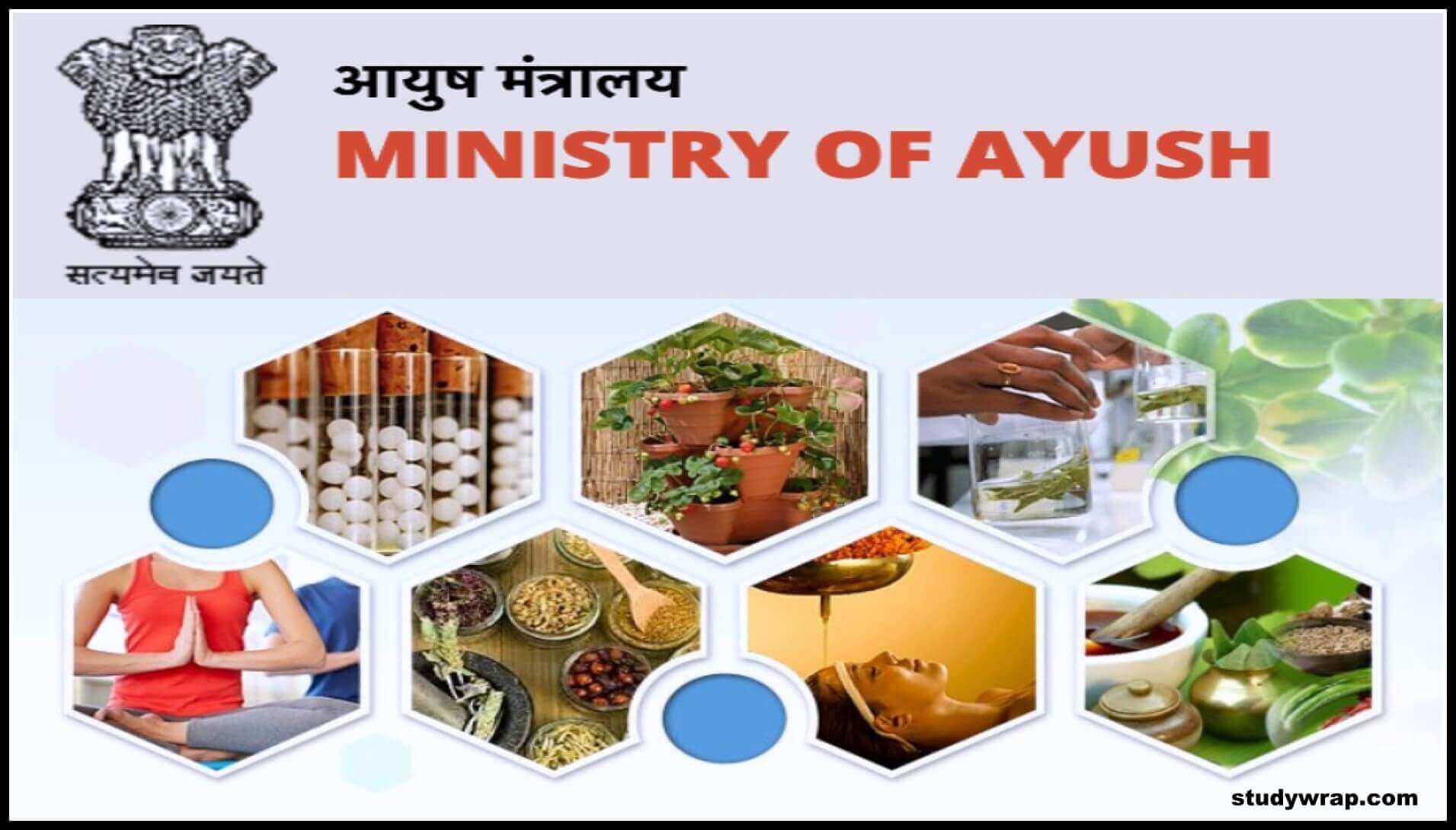Ministry of Ayush – Schemes & Programs
Ministry of Ayush
Table of Contents
The Ministry of Ayurveda, Yoga & Naturopathy, Unani, Siddha, Sowa Rigpa and Homoeopathy (abbreviated as AYUSH) is purposed with developing education, research and propagation of indigenous alternative medicine systems in India.
The Ministry of AYUSH was formed on 9th November 2014 to ensure the optimal development and propagation of AYUSH systems of health care. Earlier it was known as the Department of Indian System of Medicine and Homeopathy (ISM&H) which was created in March 1995 and renamed as Department of Ayurveda, Yoga and Naturopathy, Unani, Siddha and Homoeopathy (AYUSH) in November 2003, with focused attention for development of Education and Research in Ayurveda, Yoga and Naturopathy, Unani, Siddha and Homoeopathy.
NATIONAL AYUSH MISSION (NAM)
-
- National AYUSH Mission (NAM) was launched in 2014, during 12th Plan (2012-12017)
- It is a Centrally Sponsored Scheme, establishing a National Mission and corresponding Missions at the State level
- Recenty, the AYUSH Mission was approved for continuation from April 2017 to March 2020
Objectives
-
- To provide cost effective AYUSH Services, with a universal access through upgrading AYUSH Hospitals and Dispensaries, co-location of AYUSH facilities at Primary Health Centres (PHCs), Community Health Centres (CHCs) and District Hospitals (DHs)
- To strengthen institutional capacity at the state level
- Support cultivation of medicinal plants by adopting Good Agricultural Practices (GAPs)
- Support setting up of clusters through convergence of cultivation, warehousing, value addition and marketing and development of infrastructure for entrepreneurs.
Salient Features
-
- Centrally Sponsored Scheme introduced in 2014 and has been extended further till 2020.
- AYUSH systems of medicine, namely Ayurveda, Yoga & Naturopathy, Unani, Siddha & Sowa-Rigpa and Homoeopathy.
Components of the Mission
-
- Mandatory Components (80% of the Resource pool)
-
- AYUSH Services (including co-location of AYUSH facilities at Primary Health Centres (PHCs), Community Health Centres (CHCs) and District Hospitals (DH)
- AYUSH Educational Institution
- Quality Control of ASU &H Drugs
- Medicinal Plants
-
- Flexible Components (20% of resource pool)
-
- AYUSH Wellness Centres including Yoga & Naturopathy
- IEC activities,
- Tele-medicine
- Crop Insurance for Medicinal Plants
- Public Private Partnership provision and Interest subsidy component for Private AYUSH educational Institutions.
-
- Monitoring and Evaluation – Dedicated MIS monitoring and evaluation cell would be established at Centre/ State level.
- Mandatory Components (80% of the Resource pool)
Strategy
-
- Providing cost effective AYUSH Services
- Universal access to AYUSH services through upgrading AYUSH Hospitals and Dispensaries Co-location of AYUSH facilities at Primary Health Centres (PHCs), Community Health Centres (CHCs) and District Hospitals (DHs)
- Strengthening institutional capacity at the state level through upgrading AYUSH Educational Institutions (Human Resource Development), Pharmacies, Drug Testing Laboratories and enforcement mechanism
- Supporting cultivation of medicinal plants by adopting Good Agricultural Practices (GAPs) to provide sustained supply of quality raw-materials
- Support certification mechanism for quality standards
- Support setting up of clusters through convergence of cultivation, warehousing, value addition and marketing and development of infrastructure for entrepreneurs
- Research in AYUSH
- Special focus on specific needs of vulnerable areas
CENTRAL SECTOR SCHEME FOR PROMOTING PHARMACOVIGILANCE OF AYUSH DRUGS
-
- New Central Sector scheme introduced by Gol.
Objectives
-
- To develop the culture of documenting adverse effects and undertake safety monitoring of AYUSH drugs
- For surveillance of misleading advertisements appearing in the print and electronic media.
Salient Features
-
- Establishment of 3 Tier Network – It comprises of –
-
- National Pharmacovigilance Centre (NPvCC),
- Intermediary Pharmacovigilance Centres (IPvCCs) and
- Peripheral Pharmacovigilance Centres (PPvCC).
-
- National Pharmacovigilance Centre – All India Institute of Ayurveda, New Delhi, an autonomous body under the Ministry of AYUSH, has been designated as National Pharmacovigilance Centre for coordinating various activities of the initiative.
- Representatives of Central Drug Standards Control Organisation as the national drug regulatory authority and the Indian Pharmacopoeia Commission, being the WHO Collaborating Centre for Pharmacovigilance in the country, are associated in the initiative as mentor and guide.
- Intended impact – Pharmacovigilance initiative will facilitate detection of potentially unsafe ASU&H medicines and misleading advertisements for taking regulatory action against them.
- Establishment of 3 Tier Network – It comprises of –
MISSION MADHUMEH
-
- Launched on 28th October, 2016 (1st National Ayurveda Day)
Objectives
-
- to provide cost-effective treatment & control of non-communicable disease of Diabetes through Ayurveda.
Salient Features
-
- Implemented across the country through a specially designed National Treatment Protocol -“Prevention and Control of Diabetes through Ayurveda”
- Madhumeha Assessment Tool (MAT) – For self-assessment of the people with regards to possibilities of diabetes
- Indigenous Anti-Diabetes Ayurveda Medicine – “BGR34” – for Type-2 diabetes, developed by CSIR
SWASTHYA RAKSHA PROGRAMME
-
- Linked with “Swachh Bharat Abhiyan” by promotion of cleanliness in villages.
Objectives
-
- To promote health and health education in villages awareness about cleanliness of domestic surroundings and environment.
- To organize Swasthya Rakshan OPDs, Swasthya Parikshan Camps & Health/Hygiene awareness programme
Salient Features
-
- Initiated through
-
- Central Council for Research in Ayurvedic Sciences (CCRAS)
- Central Council for Research in Unani Medicine (CCRUM)
- Central Council for Research in Homoeopathy (CCRH) Central Council for Research in Siddha (CCRS)
-
- Awareness about cleanliness of domestic surroundings & environment. Provide medical aid/incidental support in the adopted Colonies/villages.
- Assessment of health status and propagation of Ayurvedic concept of pathya-apathya and extension of health care services.
- Documentation of demographic information, food habits, hygiene conditions, seasons, lifestyle etc., incidence/prevalence of disease and their relation to the incidence of disease.
- Initiated through
OTHER INITIATIVES of MINISTRY OF AYUSH
|
Initiatives |
Objectives and Features |
e-AUSHADHI portal |
|
AYUSH GRID |
|
e-Bhuvan herbs mobile app |
|
International AROGYA 2017
|
|
National Ayurveda Day
|
|
For more Government Schemes and Programs from Various Ministries, You can Click HereClick Here.

